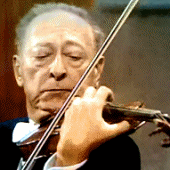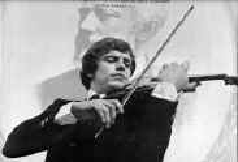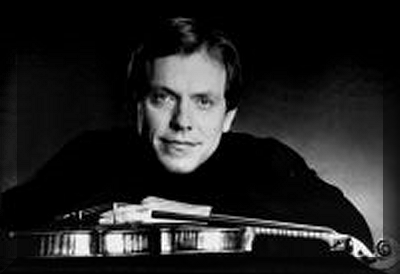![]()
|
AND
suddenly there were less.
After the premature deaths of Varujan Kojian and Erick Friedman we
learned in late
February 2011 of the untimely death of yet another Heifetz
former student. An entirely different case to that of Erick Friedman's,
Eugene Fodor's career seemed nevertheless, to echo some similarities. Eugene was born in Colorado and grew up on a ranch. He rode horses and loved the open air. But upbringing was strict and he was made to practice the violin several hours a day before he'd be allowed to do anything else. At times his father would whip him with a razor leather strap. It was tough to be a child prodigy, as Heifetz knew only too well. After studies with Harold Wippler, Fodor enrolled in the Julliard School in New York and had studied with Ivan Galamian. Later he studied with Joseph Gingold at Indiana University before moving to Los Angeles and Heifetz. In between he managed to win the Paganini Competition in Genoa in 1972. A year of studies with Heifetz were cut short when Fodor failed to follow Heifetz's strict rules of short haircuts. Fodor thought he can get away with it by wearing his long hair under a wig in class (he would occasionally ask colleagues if any flock of hair is visible under the wig). Alas, he was seen performing a gig in Los Angeles in full "hair regalia" and Heifetz was informed. During class, when Fodor performed, Heifetz slowly circled the young man and then abruptly pulled the wig off his head. He was dismissed on the spot - one didn't get the chance to disappoint Heifetz twice. Fodor did try to make amends and for a week or so he camped himself outside Heifetz's Beverly Hills home in the hope of meeting the man and apologize. One day he did eventually catch Heifetz getting into his car and, after greeting him with a timid "Hello Mr. Heifetz", the teacher cut him short replying "I am not Mr. Heifetz" and drove away. Of his studies with Heifetz, Fodor said: "Heifetz was probably the greatest inspiration of any teacher I ever had. But his teaching techniques were sarcastic and belittling." When he bought the wig to conceal his long hair he bragged to his colleagues that he would never be caught. "I said 'I can get away with it. I can control it.' Real addict behaviour". But when he was eventually caught Fodor surmised: "It was the end of the year anyway. And a year with Heifetz is like ten years with anybody else." Claire Hodgkins, Heifetz's longtime assistant, said of those days: "Eugene had enormous ability, charm and sensitivity. His technique was near-perfect and he had faultless intonation. But he got in trouble with Mr. Heifetz. It wasn't just the wig. He wasn't practicing. He had a lazy, laid-back attitude. He was playing pool all day [a passion of his in those days]. He was probably in the upper 3 percent of students in my seventeen years of experience. But he didn't produce, he didn't work hard enough."
To everybody's and the audience shock, the Russian-dominated jury decided to withhold the first, Gold Medal prize and not award it at all. Two Russian, Ruben Agaranyan and Rusudan Gvasaliya, students of David Oistrakh and Leonid Kogan - prominent members of the jury - were named as co-winners of the Silver Medal together with Fodor. The Soviet news agency Tass explained that no first prize was awarded because none of the finalists succeeded in performing evenly at all stages of the difficult competition. Nevertheless, the Tchaikovsky Competition had opened doors for Fodor upon his return home. A recording contract with RCA followed. Jack Pfeiffer, Heifetz's recording engineer worked with Fodor on several records. "I always thought he's going to be a fine musician when he grows up. He had a major talent, but it needed to be reined in, like one of his high-spirited horses. He didn't take his talent seriously enough." Fodor always wished to play with a major orchestra like the New York Philharmonic, but this didn't work out. Disagreements with his music manager, changing agencies, TV appearance (Johnny Carson), all seemed to do no good in promoting his career. Some stage stunts, like coming on stage with three deliberately loosed strings, announcing "Ladies and Gentlemen, my violin broke, fortunately there is still one string intact" and proceeding to play Moses Fantasy on the G string with the other three dangling down from the scroll, didn't win him many admirers either. After he separated from his wife Susan, Fodor moved to Hawaii for a while where he met a new girlfriend, Deborah. By 1987 he was back in New York, partying, but depressed about the course of his career. Eventually the relationship with Deborah broke down and things came to a head in 1989 when Fodor was arrested for possession of drugs. Difficult months ensued, rehabilitation, coming to terms. Fodor was 40 years old. His youth years had to be left behind, it was time for reckoning. He'd lost a lot of weight and looked careworn. He called onto his former wife for help. "I view my career philosophically. It's kind of like recovery. I hate the disease of addiction, but if it wasn't for that disease, I wouldn't be in touch with the spirituality or the fellowship. I wouldn't have the goal of being pure in body, mind and soul. And I am grateful for that. I am still young and I can laugh at [my past] because I have my life ahead of me. I'm the artist; I'm not the guy who sits down and pokes his typewriter after hearing great music. I'm not putting them down, but I wouldn't trade places with them. A soloist with an orchestra is a thrilling experience." Not long after making a comeback, the widow of Ivan Galamian reminisced: "Eugene was troublesome, but what young person isn't? He had the potential, or he would never have been accepted by Mr. Galamian. His picture is up in a cozy room where Mr. Galamian used to warm up with them. It's a rogue's gallery: Pinchas Zukerman, Itzhak Perlman, Jaime Laredo, Young Uck Kim - you name them. A pupil's picture never went up on the wall until he had really proven himself. I found [Fodor's] picture after I had lost Mr. Galamian. I heard he was making a comeback. I thought he was going to make it. I'm the eternal optimist." Revisiting, ten days after his death (26 February 2011), Eugene Fodor's now desolate website, we can notice - as we did before - no listed activity past 1999. In 2003 a press kit was added with some attractive photos. I pause for a while. The pages are all black, by design. Somehow, I think to myself, it's quite appropriate, morning now his untimely death. The short bio is still there, including studies with Heifetz. Was Heifetz's insight so far-reaching? Did he foresee then, 40 years earlier, the omen of things to come? I wonder.
|
||







 In
1978 Fodor married his long time sweetheart Susan Davies but the couple
separated in 1984, having produced three children. Earlier on, fond as he
was of competitions, he took part in the Tchaikovsky Competition in
Moscow. What happened in that competition is reminiscent of Erick
Friedman's experience, eight years previously.
In
1978 Fodor married his long time sweetheart Susan Davies but the couple
separated in 1984, having produced three children. Earlier on, fond as he
was of competitions, he took part in the Tchaikovsky Competition in
Moscow. What happened in that competition is reminiscent of Erick
Friedman's experience, eight years previously.
